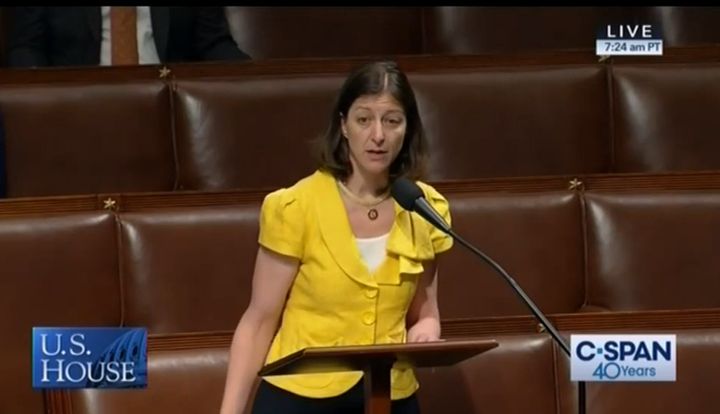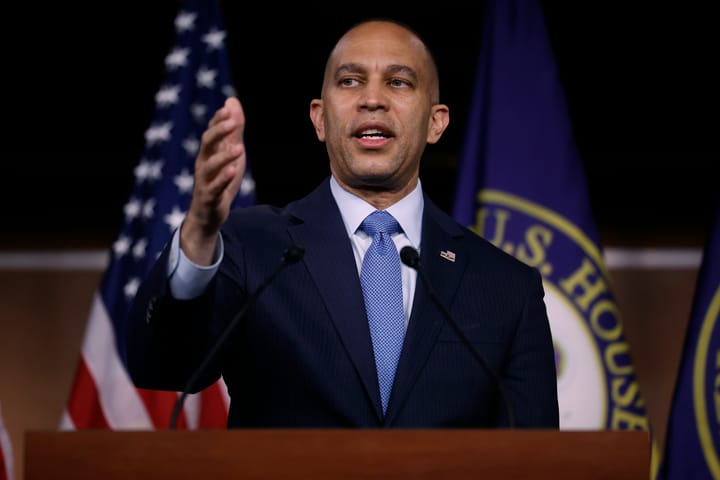Virginia’s Elaine Luria was part of a wave of Democrats elected to the House of Representatives in 2018 after pledging to reject all campaign contributions from corporate PACs. In a debate shortly before her election, she called not accepting corporate PAC contributions “a key tenet” of her campaign. Earlier in the contest, her campaign wrote that Luria is “committed to living her value of reforming campaign finance laws.”
But now that Rep. Luria has been in Washington for a couple years, all of that seems to have changed.
This afternoon, Luria is calling on her colleagues to take up her amendment that would cut the voluntary public campaign financing program for congressional candidates from the Democrats’ landmark democracy reform bill, H.R.1. The public financing provision, which has been supported by Democratic congressional leaders for more than a decade, is arguably the heart and soul of H.R. 1.
The program would let candidates who raise at least $50,000 from at least 1,000 individuals who each give $200 or less choose to receive 6-to-1 public matching funds for all small donations (under $200) that they raise. In exchange, candidates would agree to restrictions including a $1,000 cap on all donations and a limit on how much of their own money they could use for their campaign. The goal is to enable a wider group of people to be able to raise the funds necessary for going up against entrenched incumbents and establishment political figures in elections.
Luria had previously blamed large, corporate-tied campaign contributions for Congress’ failures on issues like drug prices. “There are many obstacles to cutting prescription drug costs, and I think that’s because the leadership in Congress who is there to vote on this and bring this legislation to the floor, they’re accepting thousands if not millions of dollars from prescription drug companies,” Luria said during a 2018 debate with former Republican Rep. Scott Taylor.
[Related: Former PAC Rejector Elaine Luria Is Now Taking Checks From Raytheon and Rolls-Royce]
Her amendment to strip the public financing provision from H.R. 1 is co-sponsored by Democrats Kurt Schrader (Ore.), Josh Gottheimer (N.J.), and Abigail Spanberger (Va.). It will be considered this afternoon by the House Rules Committee, which determines which amendments will ultimately move forward to the House floor to be voted on by the full chamber.
Rep. Luria was the last House Democrat to sign on as a co-sponsor to H.R. 1 this session, trailing her notoriously conservative and corporate-aligned Democratic caucus colleagues like Rep. Henry Cuellar and Gottheimer in formally embracing the bill.
Late last year, Luria’s Federal Election Commission filings showed that she had quietly begun accepting corporate PAC donations, prompting the group behind the pledge, End Citizens United, to wonder if the reports were inaccurate or if she was in fact abandoning the pledge. “Representative Luria made this pledge to her constituents as a reflection of her values,” said End Citizens United President Tiffany Muller in December. “Breaking it would demonstrate that her values have changed since she’s been in Washington or that she wasn’t sincere to voters in the first place. It will be a heavy burden on her to explain to voters why she is going back on her word.”
Her office declined to comment to End Citizens United and Sludge for several weeks, but a few weeks ago it confirmed that Luria did not take the No Corporate Money pledge again for her 2020 re-election.
Luria was elected by her colleagues this session as vice chair of the House Armed Services Committee, which oversees defense policy, weapons acquisitions, arms exports, and the annual Department of Defense authorizations bill. It’s a prime position for raising campaign funds from weapons companies and Department of Defense contractors, which is precisely what Luria has done. Her end-of-the-year 2020 FEC filing showed she received contributions from the PACs of Defense contractors BAE Systems, Boeing, General Dynamics, Raytheon, and Rolls-Royce North America.
Sludge asked Luria’s communications director for an explanation of her opposition to the public campaign financing program, but did not receive a response.
Luria and her amendment’s three cosponsors are all members of the New Democrat Coalition, a group of pro-business House Democrats whose PAC regularly takes in contributions from the PACs of major U.S. corporations and their trade associations, including Comcast, General Electric, JPMorgan Chase, Exxon Mobil, Goldman Sachs, Pfizer and hundreds more.
Originally at The Brick House Cooperative



